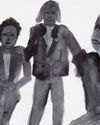Hiroshi Fujiwara’s latest collection for Moncler Genius is a manifestation of the streetwear godfather’s cerebral vision.

ON STAGE SAT three men, each a luminary in his own creative field. On the left was Hans Ulrich Obrist, feted super-curator and artistic director of London’s Serpentine Galleries. On the right, Kevin Ma, founder and CEO of Hypebeast, the mammoth digital vortex for streetwear’s latest. And in the middle, sat the anchoring draw to the evening’s assembly: the enigmatic “godfather of streetwear” and founder of streetwear label Fragment, Hiroshi Fujiwara.
When one speaks of the 55-year-old polymath — he’s a cultural consultant, designer, musician, arbiter of cool — there’s no exaggeration in giving him credit for the current state of streetwear. In the ’80s, Fujiwara headed, first to London, and then New York. He surfed subcultures — from punk to hip-hop — absorbing them all, with the intention of introducing them in Tokyo. He reformed ’90s Harajuku with newfangled high-low sensibilities, positioning T-shirts as luxury goods and inventing the notion of drip feeding product in limited quantities long before “drops” were adopted by the likes of Supreme and Nike.
This story is from the May 2019 edition of T Singapore: The New York Times Style Magazine.
Start your 7-day Magzter GOLD free trial to access thousands of curated premium stories, and 9,000+ magazines and newspapers.
Already a subscriber ? Sign In
This story is from the May 2019 edition of T Singapore: The New York Times Style Magazine.
Start your 7-day Magzter GOLD free trial to access thousands of curated premium stories, and 9,000+ magazines and newspapers.
Already a subscriber? Sign In

Look At Us
As public memorials face a public reckoning, there’s still too little thought paid to how women are represented — as bodies and as selves.

Two New Jewellery Collections Find Their Inspiration In The Human Anatomy
Two new jewellery collections find their inspiration in the human anatomy.

She For She
We speak to three women in Singapore who are trying to improve the lives of women — and all other gender identities — through their work.
Over The Rainbow
How the bright colours and lively prints created by illustrator Donald Robertson brought the latest Weekend Max Mara Flutterflies capsule collection to life.

What Is Love?
The artist Hank Willis Thomas discusses his partnership with the Japanese fashion label Sacai and the idea of fashion in the context of the art world.

The Luxury Hotel For New Mums
Singapore’s first luxury confinement facility, Kai Suites, aims to provide much more than plush beds and 24-hour infant care: It wants to help mothers with their mental and emotional wellbeing as well.

Who Gets To Eat?
As recent food movements have focused on buying local or organic, a deeper and different conversation is happening among America’s food activists: one that demands not just better meals for everyone but a dismantling of the structures that have failed to nourish us all along.

Reimagining The Future Of Fashion
What do women want from their clothes and accessories, and does luxury still have a place in this post-pandemic era? The iconic designer Alber Elbaz thinks he has the answers with his new label, AZ Factory.

A Holiday At Home
Once seen as the less exciting alternative to an exotic destination holiday, the staycation takes on new importance.
All Dressed Up, Nowhere To Go
Chinese supermodel He Sui talks about the unseen pressures of being an international star, being a trailblazer for East Asian models in the fashion world, and why, at the end of the day, she is content with being known as just a regular girl from Wenzhou.